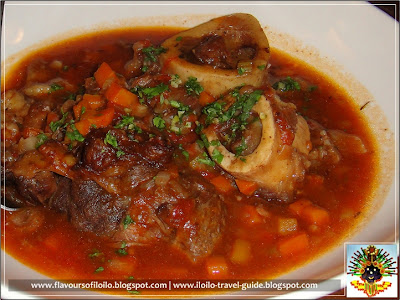Among my most unforgettable gastronomic experience in Cebu City three months ago was dinner at Café Elysa. Located at the Pari-an district of Cebu, it echoes the rich cultural heritage of the city in its array of Cebuano at the same time, colonial cuisine and how they fused them together to come up something their very own.
Unlike most fusion restaurants, Café Elysa still retains its old world charm inside out. The interior boasts of quaint furnishing and design – simple yet elegant; while outside you’ll feel magnetized to the rich heritage of Cebu. The restaurant is conveniently located within walking distance from Cebu’s historical attractions including Casa Gorordo, Museo Pari-an (Jesuit House) and Colon Street, the Philippine’s oldest.
It was the perfect place to meet up with the team from Smart Communications and Max & Marlene Limpag, whose QR Code Project has fused history with technology. Just by using any android mobile phone and scanning codes placed in cultural and historical attractions tourists can get first hand information about the heritage structure at the tip of their fingers!
Now back to the food binge and we started dinner with a crunch with these appetizingly good looking Elysa Spring Rolls. It had sprouts, ground meat, vegetables and sotanghon noodles served with chili sauce – a delectable mix of flavour and texture in every bite.
A Cebuano specialty came next – Humba with Tausi (topmost photo). These pork shanks braised with black beans were so tender – cooked in low fire for hours, I assume, that they melt in your mouth. That’s aside from the very savory sauce embracing the meat.
Next was a rather unfamiliar dish that goes on the menu as Fish in Banana Leaves with Seafood Sambal and Lemon Basil. It could look like a native dessert due to its presentation but it’s more like tamales or maybe even ma chang.
Then there’ s a bowl of grilled squid salad with all the works – tomatoes, cucumber, caramelized onions and cilantro. Another mix of appetizing flavors and contrasting consistency that surely whet our appetites even more.
Our main dish feast started with a simple meat dish but turned out to be something special - Pork Adobo with Buwad. It was pork belly adobo with a local dried fish, combining the richness of the adobo flavour with the saltiness of the dried fish. It was one discovery that was etched in my mind ever since.
Another calorific dish was next on the menu – Pork Hocks with beans, chorizo and sofrito, if I got the name right. The bone marrows alone show how cholesteroliffic the dish is, but with the savory sauce, it surely was one scrumptious plate of saucy meat.
Next dish was a mouthful - Chicken with Aubergine and Straw mushrooms in green curry sauce. A subdued dish – both in visually and in flavourful, and actually was a delicious break from the strong flavored dish we had.
And finally, Callos – with pork hocks, tripe, chorizo and beans. Another slow cooked dish that all the flavors can be savored in the rich thick sauce with the pork and beans giving us something to bite.
For dessert we had budbud, a native rice delicacy wrapped in banana leaves and the café’s specialty – flambéed tropical fruits with nuts topped with vanilla ice cream.
A perfect ending to this Cebuano feast of native, colonial and the mix thereof, making my Café Elysa gastronomic experience truly unforgettable.
And the next time I found myself in Cebu, I’ll surely be back at Cafe Elysa – hungry for more!















